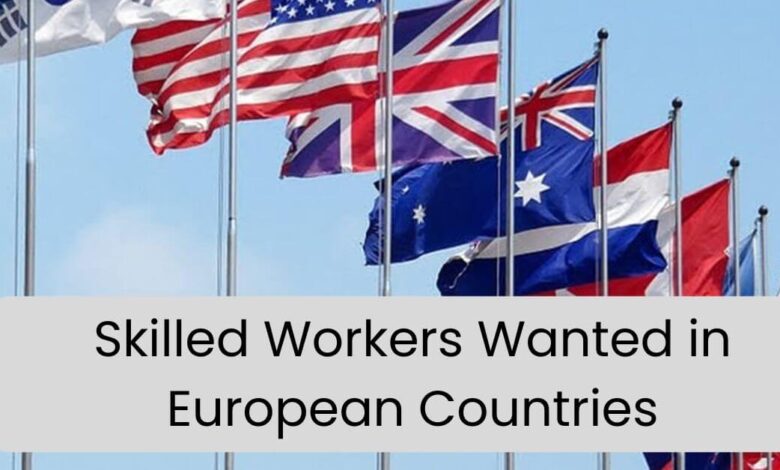Skilled Workers Wanted in European Countries 2026

According to the most recent Cedefop Labour and Skills Shortage Index (LSSI), there will be significant labor shortages in the healthcare, IT, engineering, construction, and service sectors, affecting almost every area of the European labor market. Three main causes of labor shortages are identified in the paper, which projects job market trends throughout the EU through 2035: supply-demand mismatches, retirement-related replacement demands, and employment growth.
As governments struggle to fill vacancies in high-demand areas, these statistics reveal significant employment prospects in Europe for skilled workers around the world.
Findings in LSSI Report: Which Jobs Are in Highest Demand?
Key industries with acute labor shortages throughout the EU are highlighted in the LSSI study, encompassing high-, medium-, and low-skilled job categories:
1. High-Skilled Jobs Facing the Most Critical Shortages:
- Healthcare Professionals: Growing healthcare needs and workforce retirements in several EU nations are contributing to a severe shortage of physicians, nurses, and personal care workers.
- IT & Digital Experts: As Europe speeds up its digital transformation, there is a pressing need for expertise in fields like artificial intelligence (AI), software development, and cybersecurity analysis.
- Scientists and engineers: The EU’s emphasis on sustainability is driving up demand for jobs in green technology research, civil engineering, and renewable energy engineering.
- Legal, Social, and Cultural Professionals: In the upcoming years, community support and workforce stability will depend heavily on social workers, legal professionals, and business professionals.
2. Medium-Skilled Jobs in Urgent Demand:
- Skilled tradespeople: For Europe’s continuous building boom and infrastructure requirements, electricians, plumbers, carpenters, welders, and mechanics are essential.
- Manufacturing & Machine Operators: Despite the increase in automation, workers in industrial production are still required to support growing industries.
- Transport & Logistics: To keep Europe’s supply chains running smoothly, there is a great need for truck drivers, delivery personnel, and plant operators.
3. Low-Skilled Jobs With Rising Shortages:
- Service & Hospitality Workers: As tourism recovers from the pandemic, there is an increasing need for employees in customer service, restaurant, and hotel positions.
- Personal Care & House Support: As the population ages, house aides and caregivers are in high demand throughout the EU.
- Retail Employees & Construction Laborers: Major infrastructure and commercial projects are being impacted by labor shortages in the retail and construction industries, which are difficult to fill in many EU nations.
Labor shortages are pervasive across all skill levels, and even declining industries need workers to meet replacement needs, according to the LSSI research. This indicates that there will be plenty of employment prospects for both domestic and foreign workers in a variety of industries.
Which EU Countries Have the Most Severe Labour Shortages?
The LSSI assessment states that labor shortages in the EU are not consistent, with certain nations experiencing large gaps in a variety of skill levels and sectors. The nations with the worst shortages are broken down as follows:
1. Countries With Shortages Across All Sectors:
- Germany
- Netherlands
- France
- Sweden
- Ireland
All occupational skill levels, including those in the healthcare, IT, construction, and service industries, are severely lacking in these nations. To meet the increasing demand, these nations need personnel in both low-skilled and high-skilled occupations.
2. Countries With Shortages in High-Skilled Professions:
- Italy
- Poland
- Czechia
- Slovakia
The fields with the most shortages in these nations are engineering, information technology, and healthcare. Nonetheless, there is still a steady need for low-skilled labor.
Check Also: Japan Specified Skilled Worker Program
3. Countries Struggling to Fill Low-Skilled Jobs:
- Bulgaria
- Ireland
- Portugal
These countries have a sufficient supply of highly qualified workers, but they have specific shortages in retail, hospitality, and personal care roles. To cover low-skill and service positions, they need more employees.
4. Countries Facing Mixed Labour Shortages:
- Greece
- Spain
- Netherlands
It is imperative that immigration and labor policies address the skill gaps in these nations and assist both low-skilled and high-skilled job markets, as these countries are experiencing shortages across a range of skill levels.
The LSSI research emphasizes that the labor market requirements of every EU nation are unique, necessitating customized measures to close these various manpower availability gaps.
The AI & Technology Effect: Will Automation Reduce Job Shortages?
The influence of AI and automation on European jobs and how these technologies are changing the workforce are covered in the LSSI report. Automation is predicted to generate new opportunities while also alleviating labor shortages in some industries. Below is a summary of the anticipated outcomes:
Jobs Likely to Decline Due to Automation:
- Clerical and Administrative Roles: It is anticipated that the automation of repetitive work will decrease the need for office-based and administrative positions.
- Factory Assemblers and Machine Operators: Many jobs in manual manufacturing and assembly lines will be replaced by robots and AI-driven systems.
- Retail and Customer Service: AI-powered chatbots and self-service kiosks have the potential to automate some retail and customer service tasks.
Jobs Less Likely to Be Replaced by AI:
- Healthcare Professionals: Because human connection and decision-making are so important in the healthcare industry, positions like nurses, doctors, and caregivers are still in high demand.
- Skilled Trades: Because they need practical knowledge and problem-solving abilities that robots cannot completely replace, occupations like electrician, welder, and mechanic will continue to be vital.
- Specialists in engineering, information technology, and artificial intelligence will become more in demand as the need for experts in creating and managing AI technologies grows.
How Can Skilled Workers Take Advantage of Europe’s Labour Shortages?
According to the LSSI report, skilled workers from around the world have a special chance to benefit from Europe’s continuous labor shortages in high-demand sectors. The following are important strategies to take advantage of these opportunities:
1. Identify Where Your Profession is Needed Most:
- Focus on nations where there are the most shortages for your particular profession. There are severe shortages in a number of EU countries, including in the fields of engineering, skilled crafts, IT, and healthcare. Your chances of landing a job might be greatly increased by understanding where your abilities are most required.
2. Check if You Qualify for an EU Work Visa:
- For highly sought-after occupations, a number of EU nations provide expedited visas. If your profession falls into one of these categories, you may be eligible for easier and quicker access to work opportunities.
3. Apply for High-Demand Jobs Via Official EU Job Portals:
- International candidates can use a portal provided by the European Labour Authority (ELA) to locate employment openings within the EU. These websites are an excellent way to apply directly for jobs with businesses or government-sponsored initiatives.
4. Upskill in Key Areas:
- Concentrate on developing your skills in areas that are essential for the workforce of the future, such as artificial intelligence, renewable energy, and digital transformation. Advanced technical skills in these fields will be in great demand as automation and digitalization change the work market.
5. Take Advantage of Timing:
- According to the report, there will continue to be a labor shortage in the EU after, thus now is a great opportunity for qualified people to apply and land a position in the expanding European labor market.
Skilled Workers Wanted in European Countries Best Time to Apply:
For talented workers hoping to capitalize on Europe’s labor shortages, the Cedefop Labour and Skills Shortage Index (LSSI) provides a clear call to action. Europe urgently needs foreign talent to fill these skills and sustain continued economic growth in industries including healthcare, IT, engineering, skilled trades, and personal services.
Key Takeaways:
- Demand for Skilled Workers: Human-centered jobs in healthcare, technology, and infrastructure will continue to be in high demand, even while some employment roles—such as clerical and factory roles may become less relevant as a result of automation. These industries are in greater demand than ever of qualified workers.
- New Opportunities in Green & Digital Technologies: High-paying, future-proof professions are being created as a result of the green and digital shifts, especially in fields like artificial intelligence, cybersecurity, and sustainability. Professionals with experience in these domains will be well-positioned to gain from this expansion.
- Time to Act: According to the LSSI research, competent workers should apply for jobs in the EU as soon as possible. Countries are actively looking for foreign labor, and in the upcoming years, demand is only anticipated to increase.
Why Now?
- Fast-Track Visa Options: For occupations with high demand, several EU nations provide fast-track visas.
- Long-Term Opportunities: In Europe, there will be a sustained need for competent workers, which will guarantee long-term job security and professional growth.
- Global Mobility: Workers wishing to immigrate and establish a profession in Europe have a fantastic opportunity due to the EU’s drive for foreign talent.
Conclusion:
In conclusion, the labor shortages in Europe create an unprecedented opportunity for skilled workers to immigrate and secure well-paying, sustainable jobs. Now is the time to apply and make the most of Europe’s need for talent!
Frequently Asked Questions:
What are the main causes of labor shortages in Europe?
The main causes of labor shortages in Europe are mismatches between supply and demand, replacement requirements connected to retirement, and job growth in a variety of industries.
Which countries in the EU have the most significant labor shortages?
While nations like Italy, Poland, and Bulgaria have shortages in particular professions, Germany, the Netherlands, France, Sweden, and Ireland have severe shortages across various sectors.




